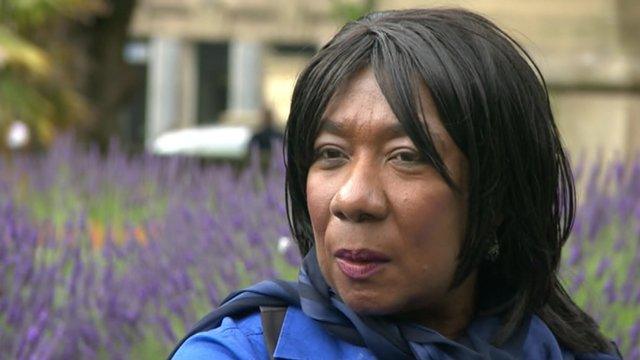Anthony Walker murder: What has changed in the decade since his death?
- Published

Anthony Walker was chased into a park in Huyton and killed with an axe on 30 July 2005
Ten years ago, Anthony Walker was chased from a Merseyside bus stop and bludgeoned to death with an ice axe by a pair of racist killers. But has the teenager's killing been a catalyst for change in the decade that has passed?
Anthony, an 18-year-old student, was attacked in Huyton, Knowsley, and left to die from his injuries at a park entrance. It was murder that caused widespread revulsion.
His killers Michael Barton, then 17, and his cousin Paul Taylor, then 20, are both serving life sentences for murder. Both men went on the run and Barton's brother, footballer Joey Barton, appealed for their return.
Much work has been done since the killing to try to improve race relations in Merseyside - with a foundation set up, external in Anthony's name - and a special Sigma police unit to tackle hate crime.
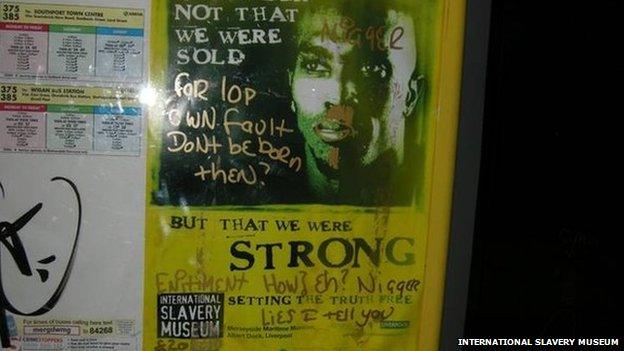
Racist graffiti was daubed on an International Slavery Museum poster in Liverpool earlier in the year
But what difference, if any, has been made?
"He wanted to be a judge, he wanted to be an actor, he wanted to be a sports star," says Anthony's mother Gee, as she reflects on her son.
"I'll never get to see what his children will be like. All I know is that I miss him and it should never have happened.
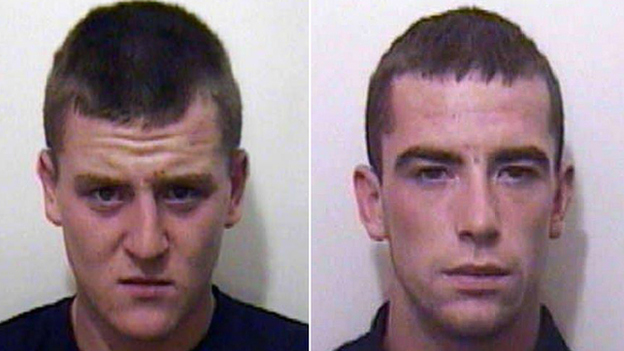
Michael Barton (left) and Paul Taylor (right) are serving life sentences
"I didn't get to say goodbye. I didn't get to hold my son - it's not allowed, because you will contaminate evidence."
Grief, she says, never goes away but you just "learn to live and cope".
After the murder, racist graffiti was daubed in the park in Knowsley, which caused her further distress.
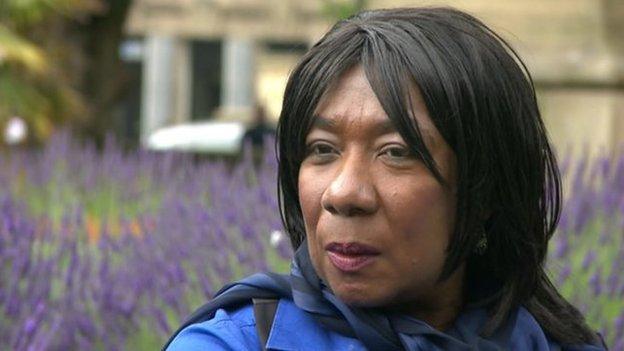
Anthony Walker's mother Gee is hopeful things are improving in Knowsley
But Mrs Walker says her other son was recently racially abused at a bus stop and "somebody stepped in".
It gives her hope for the future: "Something's happening here. Somebody cares and we are challenging this behaviour."

Race and crime in Merseyside
There were 1,700 race hate crimes in Merseyside in the past year - up 13.4% on a decade ago
ONS statistics say 96.6% of the population of Knowsley, where Anthony died, is white
Just 508 people in the borough are of black heritage

Performance poet Levi Tafari points out that "institutionalised" racism is widespread in Liverpool.
"Loads of Scousers have Irish and other foreign roots, but they're seen as being British because they are white," he says.
He describes the city as a mixture of cultures, like the eponymous Scouse stew. "We have the oldest black community in the UK, we need to live together."
Although social media and the internet have made the world smaller, he believes "some things have not advanced and are in the Middle Ages".
'Hate speech'
Anthony's sister Dominique, who works for Merseyside Police's Sigma hate crime unit, believes the advance of social media in the past decade has actually given voice to the racists.
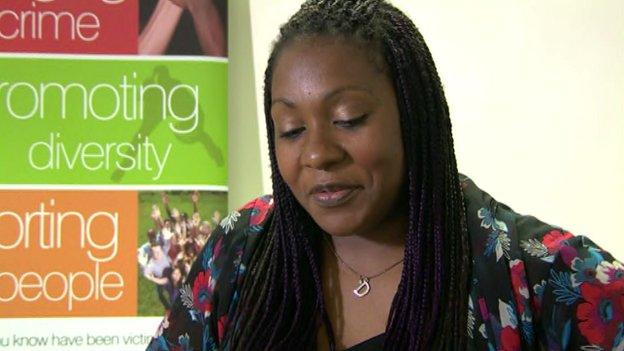
Dominique Walker says she empathises with victims of race hate crimes
"What I'm finding increasingly, you only have to turn on to Facebook, you have got Britain First, you have got the EDL and other pages rising up saying things and you have got hate speech," she says.
But she says the only way for her to move forward since the loss of her brother has been to forgive his killers.
"People think if you forgive you are soft, but you're tougher than anything.
"I do it to help people like me and for me to be able to be empathetic towards people."
Swastikas
Dr Richard Benjamin, director of Liverpool's International Slavery Museum, believes agencies are more co-ordinated than they were in 2005.
However, he says the museum is "consistently" a target of racists and graffiti is not uncommon, with swastikas and far-right stickers appearing outside the museum.
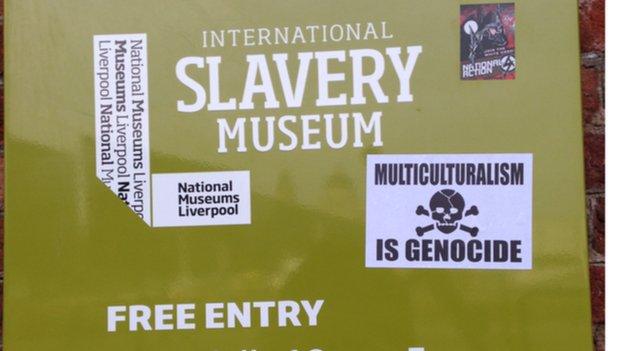
A "Multiculturalism is genocide" sticker was recently attached to the museum's sign
Dr Benjamin believes it is society that makes people racist and sees the museum's role as being "to challenge and educate".
He added: "People say Anthony Walker was in the wrong place at the wrong time.
"But should we live in a society where you can't walk freely without getting an axe in your head because of your colour?"
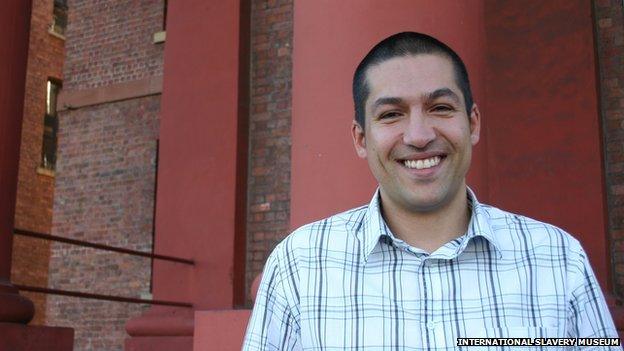
The International Slavery Museum is targeted by racist graffiti and stickers
Dr Benjamin says he is "humbled" by the strength and dignity shown by the Walker family, a view that is echoed by Merseyside Police and Crime Commissioner Jane Kennedy.
She says: "We owe a debt of gratitude to Gee Walker and her family for the steadfast and dignified way in which they have reminded us, not only of their loss but of the cruelty and senselessness of it."
Mrs Kennedy believes the police response has improved but says "there is still more to do".
She has pledged to continue working with the Anthony Walker Foundation and those "who want to protect and defend the vulnerable".
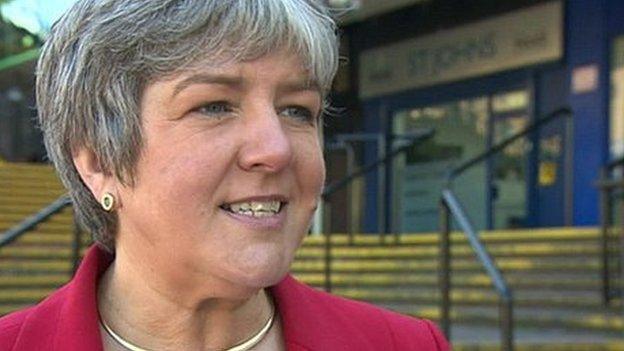
Jane Kennedy says police have improved their response to hate crime
And so, for some, including the Walker family themselves, there is comfort to be drawn from what has happened in Merseyside since Anthony's murder.
Dominique Walker says she believes the generation below her "are a lot more aware and a lot more astute" than they were a decade ago.
But she added: "It shouldn't take my brother to have been a sacrifice for us to talk about race - that's not fair. That's not fair."
- Published22 July 2015
